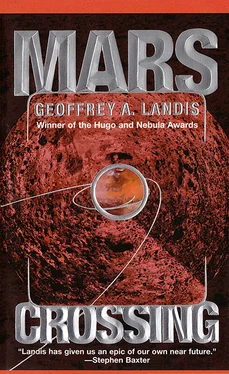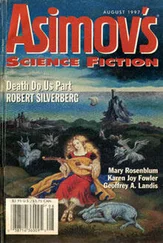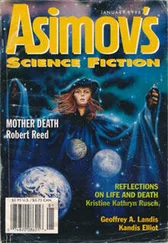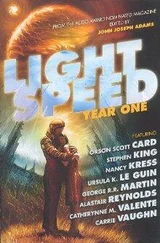He raised his hands to his head. He couldn’t see anything—it looked for all the world as though he was in Africa—but he could feel the helmet, and grabbed it and pulled it up. Africa shrank to two dimensions and pulled away.
He put the virtual reality helmet back on its stand by the treadmill, grabbed for his water bottle and took a long pull, then pulled back the curtain on the exercise booth. The exorcise sessions were tiring, but he always felt refreshed and fully energized after. He wished that Don Quijote had a better exercise facility, one with a full sensory reality. In Houston, he would have been able to smell the lion, would have felt a breeze, and the texture of the ground under his feet would have varied as the terrain changed. He would have been able to climb the rocks, swing from trees.
More than that, though, he wished he could shower after exercising, but in the cramped cabin of Don Quijote that was clearly impossible, and, as always, a sponge bath was the best he could do.
With Ryan and Chamlong out checking the Dulcinea , and Tana and Estrela out on EVA samples, the cabin seemed almost spacious. Trevor should have been monitoring the radio, but as Radkowski grabbed his sponge, he saw with some disgust that Trevor’s eyes were masked and his attention distant, involved with some sort of simulation or video game. So nobody was paying attention to Ryan and Chamlong checking out the Dulcinea .
Well, if there had been a problem, Ryan or Tana would have contacted him by an emergency page, which would get to him wherever he was. Still, it was a breach of discipline.
While he started his sponge bath, he reached toward the radio to listen to what the rest of the crew was doing. And, as if in response—he hadn’t even yet turned on the radio—the emergency page lit up. Somebody had hit the panic button.
He hoped that it was nothing, but John Radkowski’s instinct for trouble was already giving him warning signals. He had the sudden sinking feeling that they were in deep trouble.
When Chamlong Limpigomolchai had been a small child, perhaps five or six, his parents took him to a temple. The golden Buddha had seemed uninteresting to him, but he vividly remembered the Nagas, the huge, brightly painted, seven-headed serpentine monsters who guarded the stairs. After the temple, his mother had taken him to have his fortune told. The fortune-telling woman had seemed more like a clerk than a wizard; she had taken his mother’s money, barely glancing at the number written on the lucky stick he had shaken from the fortune tube, and pulled a sheet of tightly rolled paper out of a pigeonhole and handed it to her without a word of comment.
YOU WILL TRAVEL FAR, the fortune said, BUT WILL ALWAYS RETURN HOME.
Later, when he went to Japan for schooling, he thought, yes, I am traveling far, but I will always return home. The thought gave him comfort; he knew that he would not die while abroad. And later, when he went to study for a doctorate in an American university by the name of Stanford, he thought, yes, this is it, this is what the old woman meant when she said I will travel far. But I will return home.
And he traveled further yet. His fellow astronauts had always marveled at the calm way that he faced danger. He had been on extravehicular activity once—a spacewalk—and an incorrectly programmed robotic arm had moved unexpectedly, severed his tether, and tossed him spinning into space. He had turned on his emergency locator beacon—his radio had been smashed in the same accident, so he had no idea if his beacon was being heard, or even if anybody had seen the accident. He turned down his oxygen partial pressure to the minimum to extend his breathing time and calmly closed his eyes to meditate. Two hours later, when he was picked up, he opened his eyes, nodded once, and said, “Ah, there you are.”
And now he was on Mars. But I will return home to die. As it had been all his life, he knew that, no matter how bad things might get, he would make it home.
The fortune-teller had been right about his traveling, far more right than she could possibly have known.
But she was wrong about his returning home. Chamlong Limpigomolchai, the farthest-traveling Thai in the history of his country, would never leave Mars.
Chamlong Limpigomolchai had been a quiet man. John Radkowski had always respected Chamlong—he had thought that of them all, he had been the best among the crew—but he had never really understood his motivations. He did his job, never complained, never did less than his best, and never talked about his personal life. Now he would never know him better.
Radkowski had seen people die before; death was an old familiar feeling. First was the shocked feeling. Why? Then, following hard on after the first shock, was the awful feeling of relief. He had known that the mission was going to be dangerous, and that there was a good chance that one or all of them would die. And now it had happened—and he was still alive. He damned himself for what he felt, but he couldn’t help feeling it.
And, following the relief, the guilt.
The Mars soil was harder to dig in than he had expected. There was a slight breeze, which helped carry the dust of digging away, but by the time they had dug a grave for him, all of their suits were painted a dull yellowish orange. Tana and Estrela carried his body. After Tana had done the autopsy, they had put him back in his suit for burial. Radkowski had looked over Chamlong’s meager personal effects, trying to find something that would have meaning for him. He had no photos, no letters from home. He knew that Chamlong hadn’t been married—that had been one of the criteria for crew selection—but surely he had some person at home to share his life with. But if so, he left no trace of it. The only personal item Radkowski found was a tiny yellow and red dollhouse, something that seemed almost ridiculous among his other utilitarian possessions. Radkowski carefully placed it in with the body.
“Ashes to ashes,” he intoned. “Dust to dust.” Back in the Air Force, they had their own second verse to this reading: “And if the Lord won’t take you, why, the devil, he must.” But it was one thing to say that when getting drunk over a dead friend, and quite another to say it aloud at a funeral, so instead he said, “A moment of silence, please.”
And Estrela, Ryan, Trevor, and then Tana, one at a time, put a shovelful of Martian dirt into the grave, and then silently piled a cairn of rocks over it.
John Radkowski stood watching, silent with his thoughts. It’s not a disaster, he told himself. One dead, a stupid accident, we can deal with it. Thank the Lord the rest of us are okay. If this is as bad as it gets, we’re lucky.
He could never admit it to his crew, but John Radkowski was scared.
The expedition is fine, John Radkowski told himself. The expedition is fine.
The expedition was not fine. Ryan consulted by video-link with support engineers on Earth until the Earth had set below the horizon. It was annoying that the communications relay satellite that Agamemnon had left in orbit had failed; after working perfectly for seven years, it was just bad luck for it to fail when it did. Without a communications relay, they could consult Earth only during the Martian day, when the Earth was visible in the sky.
Without mission support, Ryan worked alone, late into the night.
He answered questions from the other crew members in monosyllables or not at all.
Fiber-optic probes lowered through the piping and into each of the tanks confirmed what Ryan knew: The Dulcinea ’s fuel tanks were dry.
Читать дальше












